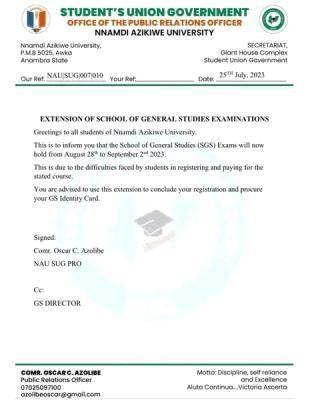
Barr. C.C. Okeke, the Registrar, Nnamdi Azikiwe University, UNIZIK, Awka, tells you that he has spent most of his productive life fighting corrupt practices in the system. When the 4th substantive registrar says that he is not joking for his rare dedication to service, coupled with his humility has endeared him to both staff and students.
This is not surprising because at UNIZIK he maintains an open door policy! In a recent chat with Education Review, he noted that fighting corrupt practices and maintaining an open door policy, in addition to the “Student-First” philosophy which he said formed part of the building block of Prof. Boniface Egboka’s administration, have kept his career flourishing like a rose planted by a river bank.
“I have said it that you don’t gain anything by allowing anybody leave your office unhappy; that you don’t gain anything by failing to solve the problem you know you can solve for anybody that walks into your office,” he noted. “I have told them (his staff) that they don’t gain anything by keeping a student or any member of the public waiting or saddled with a problem without intervening to see how much of that problem can be solved.
“I have told them that why they are here is because of these students, and probably members of the public who come for one thing or the other. And for goodness sake, you don’t have to wait for gratification, or claim that you’re very busy, or, for a flimsy reason, refuse or neglect to do your work.
As an administrator, you should be up-and-doing, you should be able to come to work early, once God has given you good health. And you should not use your position to malign anybody simply because you feel you have a position. What is this position after all, if not granted by God? And so, this is the legacy I want to leave behind for people. I have always emphasized it, I have sung it.
“This morning, a security man exploited some students for no just cause and I invited him and told him to return the money immediately. I cannot see you taking money from somebody because you want to give that person admission or assist the person to gain admission. Or take money from somebody because you want to assist him get a job. Discipline, decorum, contentment and ability to serve humanity with complaint are the legacies I want to leave behind.
When we were growing up as up-and-coming administrators, I dreaded doing some of these little mean things. What will I gain exploiting somebody because I’m in a position that God has given to me? This is my prayer that anybody coming over here will not abuse the office given to him so that this society would be better for us. The university is not a business premises. It is a centre of excellence. No matter the circumstance you find yourself, you should try and live above board, as far as self-discipline is concerned.”
Explaining further what he means, he said: “I like to attend to members of the public for the joy of it and, not necessarily for gratification. Each time I’m in a position where I have to attend to students, my fellow staff or members of the public, it gives me a lot of joy, and that is why I hate to see students being kept waiting unduly or being asked to come tomorrow when you know that the problem can be solved today.
I hate seeing members of the public lining up to wait for one assistance or the other when you know that they can come in and you solve those problems and put them behind you. I like to attend to people, to listen to them even when their problems may not be immediately solved.
These are the things that endeared me to people on the administrative job I’m doing. And this is why I find myself staying in the office from morning to the close of work on daily basis, and that is why I have sacrificed myself to ensure that this work is well done. This is exactly why I am where I am today otherwise if I were doing this job haphazardly, probably I wouldn’t have been here.”
Okeke noted that he brought back the seemingly lost soul of administration in the institution particularly as it affects the registry department, in addition to granting his subordinates some level of autonomy which has never happened in the history of the institution, a situation he said has tremendously improved the productive output of the staff.
Hear him: “In the university system, the registry is a very important department where all the records of both staff and students are kept. We have seven units under my office and these seven units are manned by deputy registrars. Before now, the registry was centralized in its operations. Even materials required for day-to-day administration of the department were centrally procured and distributed and this brings a lot of delay in the work output.
“But over the years, these units of the registry have grown so much in size and responsibilities. And so I decentralized the status quo. So each unit, senate unit, council unit, general administration unit, exams unit, admissions unit, records, would individually ask for what they need to run their various offices.
They would pass through me to the Vice-Chancellor and I would justify the need to the Vice-Chancellor, who would then approve. This gave them a sense of belonging. I would say that part of why I succeeded in doing that is the good relationship existing between the Vice-Chancellor and my humble self. One of the major problems of a Registrar is that he is always at the centre of activities, good or bad.
The Registrar is responsible to the Vice-Chancellor on day-to-day basis and to the chairman of the governing council by virtue of his position as the secretary to the council. One of my predecessors described the Registrar as a tree standing on the road to a farm and which anybody going to the farm must leave his own knife cut on. A Registrar is at the centre of the students, staff matters, senate matters, council matters, etc. Consequently, it takes the grace of God and special wisdom for him to manage his superiors, his peers, his subordinates and the students.
“On the issue of ICT, we have improved a lot on our ICT, on record-keeping. Before now, people would ask for their transcripts and it would be difficult to process as they were done manually.
But today many people would ask for their transcripts and get them easily. It is not like in the olden years when many people are not aspiring to do their post-graduate programmes. Today, virtually all graduates want to do a post graduate programme especially because they don’t have anything doing to keep themselves busy.
Therefore, they try to get a higher certificate that would give them a good job. And, so we now have more people in the postgraduate programmes than ever.
So the quests for transcripts have become very high from all over the world. To be able to meet the demand requires very dedicated staff. And I have been able to identify very good staff who are now working at the records unit to make sure that complaints about non-release of transcripts is reduced drastically.”


